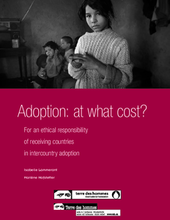The second half of the twentieth century saw a considerable expansion in intercountry adoption. There is, however, considerable growing concern about the number of practices which do not respect the interests of the children, child trafficking being the most alarming. Such practices include the buying and selling of children, where the money spent on these transactions does not correspond to the professional services required in adoption procedures, as well as illegal practices such as faked documents, lack of respect for laws and regulations, pressure put upon parents and authorities in the countries of origin, corruption, child abduction, etc. Besides the ethical objections to such practices, children are being adopted who are not necessarily in need of adoption in violation of their rights. Faced with this worrying situation, many criticisms have been leveled at the countries of origin. Terre des hommes wishes to highlight the co-responsibility of the receiving countries with regard to existing bad practices and child trafficking.
Terre des hommes thus initiated a comparative study of the legislations and practices of six European receiving countries. The results of their findings underscore the necessity of increased attention and action on the part of European authorities to address the rights and reality of adoptable children in the world and the effects of some practices in certain European countries on these children.
In regard to eight worrying aspects of current adoption practices, Tdh includes recommendations for an ethical co-responsibility of the receiving countries relative to the children and their countries of origin. The publication calls for political measures by the receiving countries, individually and collectively, in the interests of children, especially within the framework of the Hague Conference on Private International Law and the European Union.

